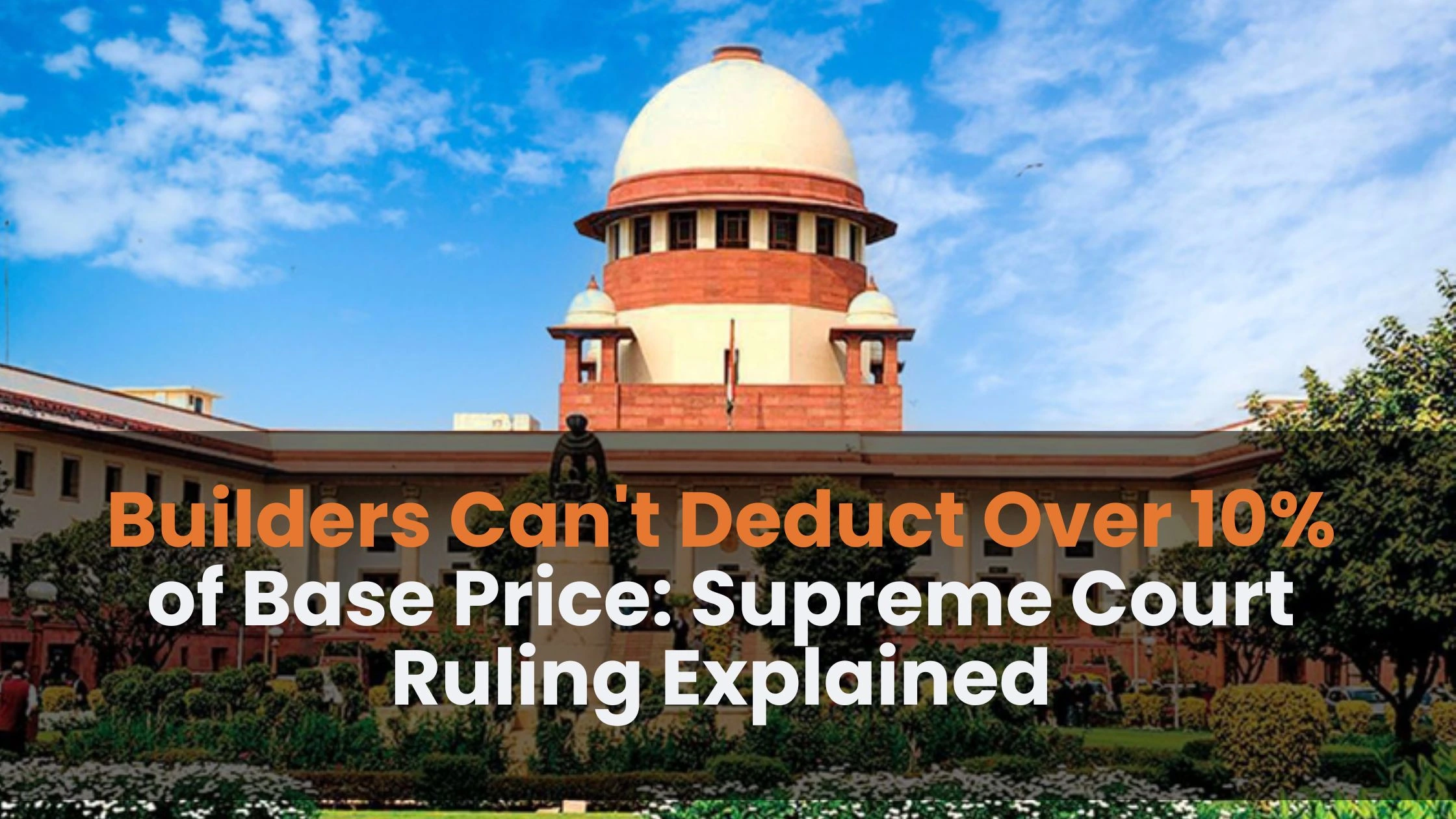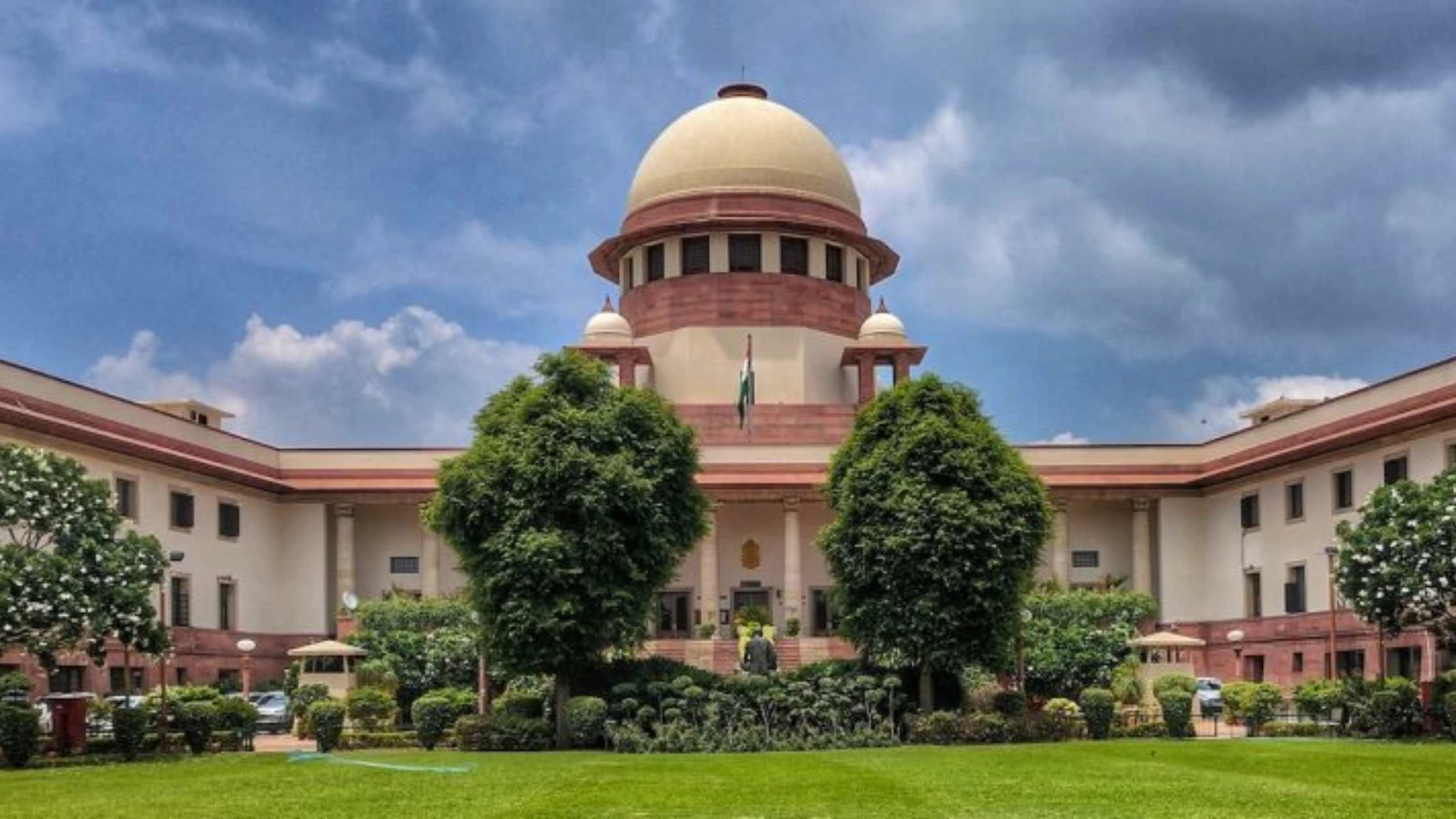Table of Content
▲- What is Earnest Money?
- The Old Practice and Why It Was Unfair
- What the Supreme Court Ruled
- Breaking Down the Ruling
- Why This Ruling is Important
- How Does the Ruling Affect Builders?
- Benefits for Builders
- What Should Homebuyers Do?
- The Bigger Picture: A Step Towards a Fairer Real Estate Market
- Conclusion
When you decide to buy a house, one of the first steps is to show your serious intent by paying an amount called "earnest money." This money is like a small deposit you give to the builder to reserve the property while the paperwork is being sorted out. But what happens if you change your mind or something goes wrong, and you decide to cancel the booking?
Recently, the Supreme Court of India made a crucial ruling about how much money builders can deduct from your earnest money deposit if you cancel the deal. This blog explains the ruling in simple terms so that anyone can understand its importance.
What is Earnest Money?
Earnest money is a small amount of money paid by a homebuyer to show that they are serious about buying a property. Think of it like a "good faith" deposit. When you pay this deposit, the builder or seller holds the property for you while all the necessary checks and paperwork are completed. If everything goes well, this earnest money is usually adjusted against the final sale amount of the property.
However, if for any reason the deal is canceled, maybe the homebuyer decides not to buy or the builder cannot deliver as promised the question arises: How much of that earnest money can the builder keep as compensation for the cancellation?
Also Read: Mahindra Lifespaces Rs 950 Cr Redevelopment Boost for Mumbai
The Old Practice and Why It Was Unfair
Before the recent Supreme Court ruling, many builders would deduct a significant amount from the earnest money if a homebuyer canceled their booking. Often, the deductions were much higher than what most people thought was fair. Homebuyers found themselves losing a large portion of their deposit, even if they had valid reasons for canceling. This practice was not only confusing but also created a lot of disputes between homebuyers and builders.
For example, if you paid 10% of the property’s base price as earnest money and later decided to cancel the deal, some builders might have kept a large chunk of that deposit as a penalty. This practice was seen as unfair because it put homebuyers at a disadvantage and did not give them enough protection.
What the Supreme Court Ruled
In a landmark decision, the Supreme Court of India ruled that builders cannot deduct more than 10% of the property's base price from the earnest money deposit if the homebuyer cancels the deal. This ruling is a major win for homebuyers and aims to make the property buying process more transparent and fair.
Breaking Down the Ruling
- 10% Limit: No matter what, the builder cannot take away more than 10% of the base price of the property as a penalty when a homebuyer cancels their booking.
- Base Price Focus: The deduction is based on the base price of the property, not on any additional charges or costs that might have been added later.
- Protection for Homebuyers: This ruling ensures that homebuyers do not lose a significant portion of their earnest money deposit if circumstances change or if they need to cancel the deal for valid reasons.
Why This Ruling is Important
Fairness and Transparency
The ruling brings fairness to the process by clearly defining the maximum amount a builder can deduct. Homebuyers now have a clear understanding of what to expect, which reduces the chances of disputes and misunderstandings. When rules are clear, both builders and buyers know their rights and responsibilities, making the entire process smoother.
Protection for Homebuyers
Many homebuyers invest a significant amount of money when they put down an earnest money deposit. Losing more than 10% of the base price due to cancellation could put them in a difficult financial situation. With this ruling, homebuyers are better protected, ensuring that they do not lose too much money if they decide to cancel the deal.
Encouraging Responsible Practices
Builders are encouraged to be more responsible in their dealings. They must now plan their contracts and agreements in a way that is fair to both parties. This shift can lead to better business practices in the real estate market, ultimately benefiting everyone involved.
Boosting Confidence in the Real Estate Market
When homebuyers feel protected and know that there are clear rules in place, they are more likely to invest in property. This increased confidence can lead to more real estate transactions and a healthier property market overall.
Also Read: MMRDA's New Online System Simplifies Mumbai Building Approvals
How Does the Ruling Affect Builders?
While the ruling is a relief for homebuyers, it also means that builders need to adjust how they handle cancellations. Builders may have to revise their policies and contracts to comply with the new ruling. This might initially seem challenging, but in the long run, it can lead to a more stable and trustworthy market.
Benefits for Builders
- Clear Guidelines: With clear rules, builders can design their cancellation policies in a way that is transparent and fair, which can enhance their reputation.
- Fewer Disputes: When both parties understand the limits on deductions, there will be fewer legal disputes and conflicts, saving time and money for everyone.
- Improved Customer Trust: Buyers are more likely to trust builders who follow fair practices. This can lead to more business and a stronger market presence.
What Should Homebuyers Do?
If you are planning to buy a property, it is essential to understand your rights regarding earnest money deposits. Here are a few tips for homebuyers:
- Read the Agreement Carefully: Always read the booking and cancellation policies in the property agreement. Make sure you know how much can be deducted if you cancel the deal.
- Ask Questions: If something is unclear, don’t hesitate to ask the builder or a legal expert. It’s important to know what you are agreeing to before making a financial commitment.
- Keep Records: Always keep copies of all documents related to your booking and earnest money deposit. This can help in case of any disputes later on.
- Know Your Rights: Familiarize yourself with the Supreme Court ruling so that you are aware of the maximum deduction allowed. This knowledge can protect you in case a dispute arises.
The Bigger Picture: A Step Towards a Fairer Real Estate Market
This Supreme Court ruling is more than just a legal decision; it's a step towards creating a more balanced and fair real estate market in India. It ensures that homebuyers are not unfairly penalized for canceling their booking and encourages builders to adopt more transparent practices. This move is expected to benefit the entire industry by boosting consumer confidence and promoting responsible business practices.
For a city like Mumbai, where real estate is a major part of the economy, such rulings can have a ripple effect. When buyers feel secure and protected, they are more likely to invest in property, which in turn drives economic growth. A fair and transparent market attracts more investors, both domestic and international, leading to further development and modernization of the housing sector.
Conclusion
The recent Supreme Court ruling that limits the earnest money deduction to no more than 10% of the base price in case of cancellation by homebuyers is a major victory for consumer rights in the real estate market. This decision makes the property buying process fairer and more transparent, ensuring that homebuyers do not lose a significant part of their deposit if they need to cancel a deal.
For homebuyers, this means greater protection and a clearer understanding of the financial risks involved. For builders, it means adapting to a new standard of fairness that can build trust and improve the overall reputation of the real estate sector. In the long run, this ruling is expected to create a more stable and confident market, which is good news for everyone involved.
Understanding such policies and legal decisions is important because they directly affect how property transactions are conducted and ensure that both buyers and sellers are treated fairly. As the real estate market continues to evolve, rulings like these pave the way for a balanced and sustainable future.
Also Read: UP Standardizes Building Approval Fees in Ghaziabad






Ans 1. Earnest money is a deposit paid by a homebuyer to show their intent to purchase a property. It is adjusted against the final property price if the transaction is completed.
Ans 2. Builders deduct a portion of the earnest money as compensation if the homebuyer cancels the deal, covering potential losses and administrative costs.
Ans 3. The Supreme Court ruled that builders cannot deduct more than 10% of the base price of the property from the earnest money if the homebuyer cancels the booking.
Ans 4. The base price refers to the cost of the property excluding additional charges like GST, maintenance, or other fees.
Ans 5. The ruling ensures that homebuyers do not lose a large portion of their earnest money deposit, providing greater financial security in case of cancellation.
Ans 6. No, the 10% deduction limit applies only to the base price of the property, not to other fees or charges.
Ans 7. Homebuyers should carefully review the agreement's cancellation and refund policies, and ensure they understand the terms before paying.
Ans 8. By promoting fairness and transparency, the ruling boosts buyer confidence and encourages ethical practices in the real estate sector.
Ans 9. Homebuyers can challenge such deductions legally by referencing the Supreme Court ruling, ensuring they are not unfairly penalized.
Ans 10. Yes, builders are expected to align their cancellation policies with the Supreme Court ruling, ensuring compliance and fairness in transactions.